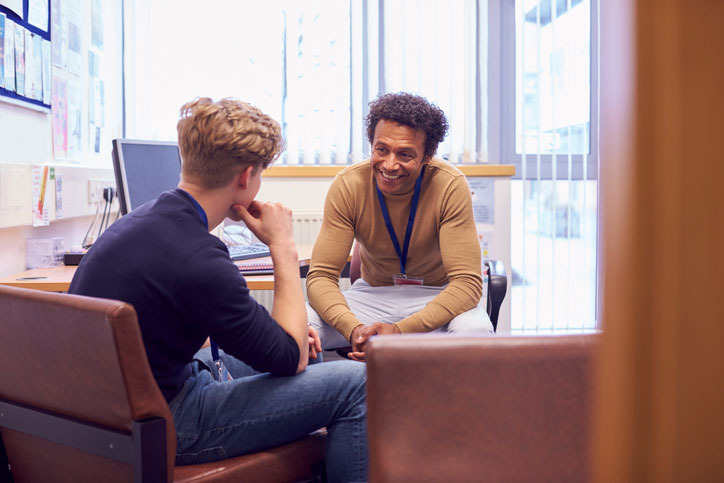Cyberbullying: The Role of a School Counselor
One of the most important school counselor duties is helping students through difficulties that they are experiencing both inside and outside of the classroom. Among the most prevalent issues students are facing today is cyberbullying, which the federal organization StopBullying defines as “bullying that takes place over digital devices like cell phones, computers, and tablets.”
Cyberbullying can occur in a variety of different online behaviors, including but not limited to the following:
- Posting mean or disparaging statements about someone on social media or anywhere else on the web
- Making threatening statements to someone or urging them to commit suicide
- Using hate speech
- Pretending to be someone else online
- Publishing someone’s private information, such as addresses and phone numbers, online to expose them to harassment (also known as doxing)
Since by definition, cyberbullying happens over remote devices, adolescents can often engage in such conduct out of view of their teachers and parents.
This is why it’s an especially important part of the role of school counselors to know the warning signs of students targeted by cyberbullying, to provide careful assistance to those students, and to raise awareness on campus about the serious harm cyberbullying can cause.

What Does Cyberbullying Look Like and Why Is It Important to Stop?
Bullying of all types can cause short term and long term problems, from feelings of intense loneliness and alienation to lowered levels of achievement to even physical health problems. Even incidents that seem to be small scale can leave a lasting impact, especially on young people and particularly when the incidents are part of a larger pattern of aggressive, unwelcoming behavior.
How Social Media and Technology Can Cause Emotional Harm
Bullying has been a problem since long before the days of the Internet, but our newly plugged-in lives have led to an increase in reported cases of bullying. There are several reasons for this.
Many speculate that because social media platforms create a space in which people do not perceive the effect their words will have on others, they therefore speak more recklessly. People are also rarely in touch with the fact that what they post online will oftentimes be published permanently, enlarging the amount of harm that can be done by an offhand comment or post.
Others also argue that the nature of social media creates more situations in which one would feel publicly shamed – much cyberbullying happens in front of an audience of one’s peers, leading to increased feelings of powerlessness and humiliation. As a report from the National Academies of Science, Engineering, and Medicine explains, “the online context where cyberbullying takes place is nearly universally accessed by adolescents. Social media sites are used by the majority of teens and are an influential and immersive medium in which cyberbullying occurs.”
All this suggests that cyberbullying can be dangerously impactful, while also being difficult for outsiders to spot. This is why it is an important part of the role of school counselors to understand the social media landscape of their students, as it is another whole arena where their social lives take place.
How Bullying Affects Student Success and Behavior
Cyberbullying can cause emotional distress in the short term, leading students to experience immediate feelings of anxiety and depression. It has also been shown to have a long term impact that can affect students’ productivity and social behaviors in high school and beyond, with some who experienced cyberbullying in adolescence continuing to feel its effects in their adult lives.
As StopBullying reports, kids who are bullied are measured to be more likely to experience academic decline (as quantified in GPA and test scores) and are more likely to skip or drop out of school. At their most extreme, these decisions can be serious enough to permanently alter the course of a student’s life.
Identifying cyberbullying quickly can be tremendously important, as it can help a struggling student get back on track in finding their long term motivation.
Students Who Bully and Bystanders to Bullying
In addition to studies on students who are bullied, studies have also shown that students who bully others are more likely to engage in violent and other risky behaviors in adolescence and beyond. Meanwhile, students who witness bullying are more likely to experience anxiety and depression, as well as being more likely to skip or drop out of school.
All this shows that the role of school counselors must be to attend to the needs of all students involved in cyberbullying. Beyond punishment, a student who is behaving maliciously on social media should receive counseling, and discussions must be had on campus in which students who witness cyberbullying online can voice their concerns.

How Often Are Students Victims of Cyberbullying?
Sadly, cyberbullying is a widespread phenomenon that is happening in places all over the US. Since many cases of cyberbullying go unreported, it is impossible to measure the true scope of the problem, but cyberbullying is thought to impact practically every high school community.
Students especially at risk of being victims of cyberbullying are LGBTQ students and other students from marginalized backgrounds. This means one of the most important school counselor duties is working to create an environment that is tolerant and supportive of students from all walks of life.
Recent Data on Cyberbullying
Unfortunately, the recent federally collected data on cyberbullying showed troublingly high rates of cyberbullying among high school students. The National Center for Education Statistics and Bureau of Justice reports that in 2019, about 16 percent of students in grades 9-12 nationwide experienced cyberbullying. Meanwhile, the Centers for Disease Control and Prevention found that an estimated 15.7% of high school students were electronically bullied in the 12 months prior to the survey, also taken in 2019.
Cyberbullying Warning Signs
It is a critical role of student counselors to be vigilant in identifying the warning signs of cyberbullying. Since student counselors only see students in a limited capacity, it is also imperative that parents know to be on the lookout for these warning signs as well. Some school counselor duties include leading the initiative to educate parents so that they know what to look for.
Behavioral Warning Signs
The behavioral warning signs of cyberbullying can be numerous, though they can manifest very differently in each student. They include:
- Anxious behaviors: Avoiding social situations that they previously enjoyed, avoiding attending school or expressing anxiety about attending school
- Depressed behaviors: Becoming withdrawn from activities, having a lack of energy to do things they previously enjoyed
Device-Related Warning Signs
One important discovery researchers have made is that a young person’s use of their device can be a warning sign about an instance of cyberbullying. Here are some of the ways a child or adolescent’s device use can signal that cyberbullying is taking place:
- They are using their phones significantly less frequently or significantly more frequently than usual
- They hide their device when parents or others are near
- They are exhibiting intense emotional responses to what is happening on their device
- They are frequently deleting and restarting social media accounts
If a school counselor is working with a student who is exhibiting some anxious or depressed behaviors, it can be helpful to instruct their parents to keep an eye on their device use.

How Can School Counselors Help?
Though cyberbullying is a difficult issue to combat, the role of school counselors can be critical to spotting the warning signs of cyberbullying and helping students affected by cyberbullying process their emotions.
School Counselor Duties
Here are just some of the school counselor duties that can help students deal with cyberbullying and even prevent it in the first place.
Notice mood behavior changes. The broad behaviors that can be warning signs of cyberbullying are outlined earlier in this article. Being on the lookout for these symptoms of anxiety and depression can be one of the best ways to identify cyberbullying and stop the problem before it goes any further.
Talk about the effects of cyberbullying in classrooms. In addition to helping students deal with active instances of cyberbullying, one of the key school counselor duties is educating students about the long-term effects of cyberbullying, how it can be damaging to whole communities, and why it’s important to report instances of cyberbullying. This can go far in helping to reduce the rate of cyberbullying on campus.
Advocate for mental health accessibility and anti-bullying policies. Most educators believe wholeheartedly in expanding mental health services and enforcing anti-bullying policies, but it can be difficult for teachers and administrators alike to set aside the time to focus on designing and implementing these services and regulations. It therefore becomes an important role of school counselors to spearhead that advocacy, drawing from their own experience with students to help shape school culture to be as supportive to students as possible.
Document cyberbullying as it occurs. School counselors often are among the first people to know about instances of cyberbullying, so it’s crucial that they monitor each new case to be sure that the affected students are not continuously under target and that bullies are not continuing to harass others.
Report to the staff applicable. Sometimes school counselors rely on the network of other teachers at the school to form a comprehensive plan to support students who have been victims of cyberbullying and to keep an eye on students who have been bullies.
Support students with resources, counseling services, etc. Some of the most rewarding school counselor duties are in one-on-one sessions with students to speak directly about their issues and needs. Here is where as a school counselor you can support an individual student and see the direct impact you can have.
Implement cell phone and device policies within schools. To combat cyberbullying, many schools have implemented strict no-device policies. This can be useful in setting a school culture that is less invested in social media, and where students do not have the ability to engage in virtual conflict during the school day.
Promote empathy and create safe spaces. As part of a campaign to raise awareness about cyberbullying and encourage students who have been hurt by cyberbullying to share and process their experiences, creating designated safe spaces with counselors available for students to talk is crucial.
School Counselor Degree Programs
In order to become a middle or high school counselor, most states require that one holds a Master’s in School Counseling. One does not need to hold a Bachelor’s in Education to apply for a master’s; a bachelor’s in any discipline will suffice. Most master’s programs take between 18 to 24 months to complete. School is focused on building the skills relevant to the role of school counselors, including aiding those with mental health concerns, learning culturally relevant prevention techniques focused on the community where you will be working, and intervention techniques. These programs almost always include the fieldwork that is mandatory for school counselors to complete as well, giving you firsthand knowledge of what the job of a school counselor entails as well as valuable work experience to put on your resume.
After you have completed a Master’s in School Counseling and completed your field work, you will be expected to complete the certification exams required by your state. Upon passing these, you will be ready to receive your state licensure.
- Top Picks
Featured Universities with School Counseling Programs
#1
Walden University
MS in School Counseling - General Program. Click here to contact Walden University and request information about their programs.
#2
Grand Canyon University
M. Ed in School Counseling (leads to initial Licensure) Click here to contact Grand Canyon University and request information about their programs.
#3
New York University (NYU)
NYU Steinhardt's accredited master of arts program in Counseling and Guidance: School and Bilingual School Counseling. Through this online program, you will gain the skills you need to become a professional Pre-K-12 school counselor, working with children and families in your community to foster academic achievement and success. Click here to contact New York University and request information about their programs.
#4
University of Denver
Earn a Master's degree in School Counseling online from the University of Denver. Learn from doctoral-level faculty in live classes and gain experience through mock counseling and in-field training. No GRE required. Click here to contact University of Denver and request information about their programs.
#5
Campbellsville University
Online Master of Arts in Education in School Counseling Click here to contact Campbellsville University and request information about their programs.
Additional Resources for School Counselors
Now is a great time to become a school counselor, with the US Bureau of Labor Statistics reporting an anticipated job growth rate of 10% for school counselors by 2031. If you are interested in learning more about becoming a school counselor, take a look at one of our guides to learn more about different areas of specialty, including middle school counselor duties and high school counselor duties . Those who are new to the responsibilities of a school counselor should take a look at our primer for new school counselors and our guide to building rapport with students.